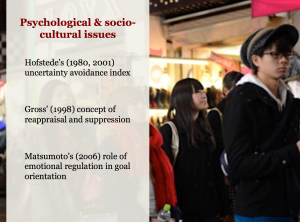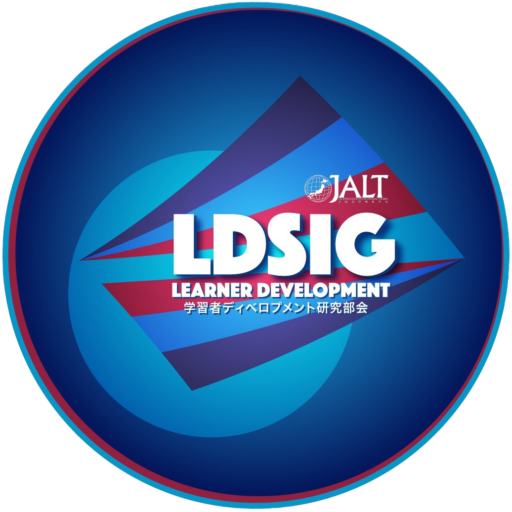
As students return from study abroad programs, many expect immediate improvements in language skills and cultural awareness. Yet complexities may arise beyond what students may foresee from such experiences. Hofstede’s (1980) concept of uncertainty avoidance and psychological factors of reappraisal, suppression, and emotional regulation all profoundly influence returning students’ cognitive behaviors. This paper analyzes video interviews with program participants and how they viewed their experiences. The students not only spoke of language gains but also on how the program enabled reflection on their misperceptions and shortcomings, and how the experience could serve as a platform for future personal development.

Hi Lee and Mehran. Thanks for posting your Forum presentation – I didn’t get a chance to see it during the Forum, so am glad you’ve submitted it here. As I’m involved in a study abroad programme at my university, this topic is particularly interesting for me.
My question concerns the focus of your work mainly. You start with a reference to Hofstede and your PowerPoint lists a couple of other references to work on emotional factors that may affect students’ ongoing language development. You state that “Complexities may arise beyond what students may foresee from such experiences” – I assume this means that many students are disappointed or disillusioned or frustrated because they don’t make as much progress as they expect, though this isn’t very clear from your sentence.
Half-way down, you mention “program participants” – jumping from a generalization (study abroad programs) to something more specific. So I’m wondering: is the focus of your presentation the program itself and the way that the video sessions maybe helped them express and overcome their emotional issues? Or is the focus the emotional issues and reflection?
What I’m wondering from this, and what I hope to find out, is whether the video session itself was a kind of catalyst for development? There is a lot of Learner Autonomy literature on reflection, but the connection with emotion seem to take it beyond that and into the realms of psychological therapy, which is very interesting.
Good luck with the write-up. I’m looking forward to reading the long version!
Hello Lee and Mehran
Many thanks for sharing the short summary and slide about your research into Japanese and foreign students’ lives and learning outside their home cultures. Although our presentations were next to each other in the forum, I don’t have a chance to see yours, so I’m glad to be able to find out a little about it now online, and I’m looking forward to learning through this discussion.
I’m really interested in how people approach interviews, because along with learners’ written reflections or diaries, drawings, and photos, they seem an appropriately learner-centred way of exploring how learners represent their own experiences; they can also provide a good platform for encouraging students to ‘narrativize’ their own lives and learning – and there are many different ways of carrying out interviews, too, so each interview study offers lots of interesting choices and decisions for the teacher-researcher too.
Some quick notes I made here included:
* interviews done with students individually, pairs or small groups
* photos and objects from their periods of studying and living abroad
* students’ opportunities to talk with each other about their experiences
* analyzing interview data
* interview language(s)
* interview logs/diaries.
I’m looking forward to learning more about how you approached the interviews and what you found interesting about the way of doing interviews that you followed — many thanks in advance!
Cheers
Andy